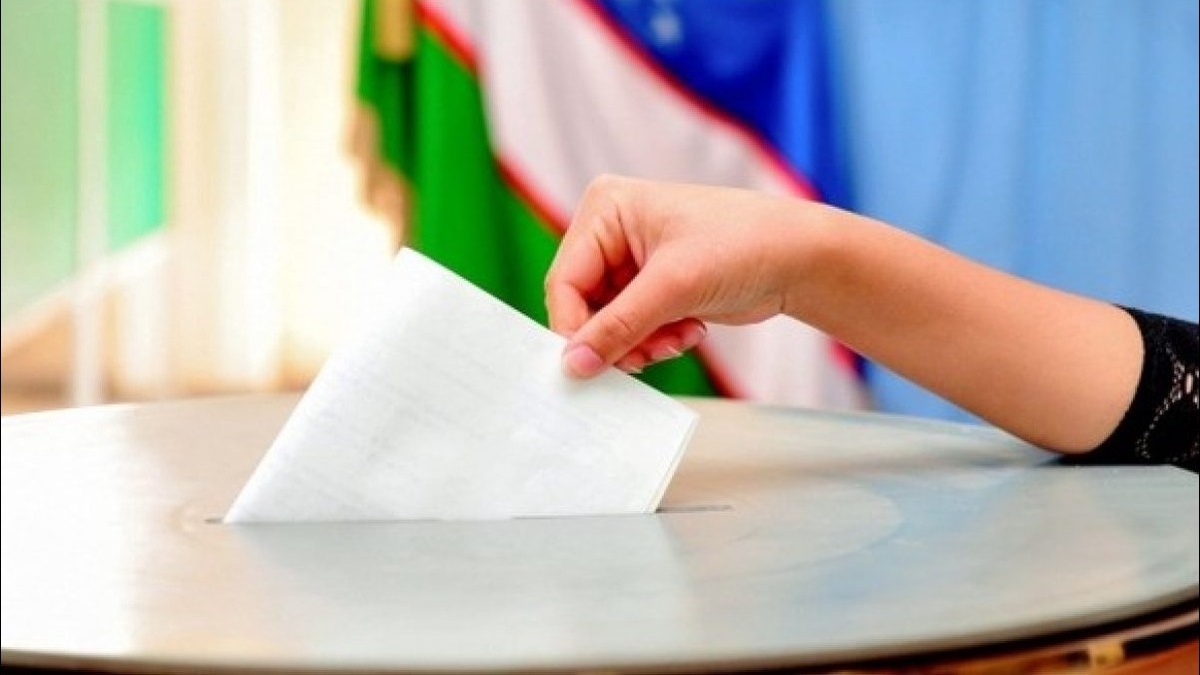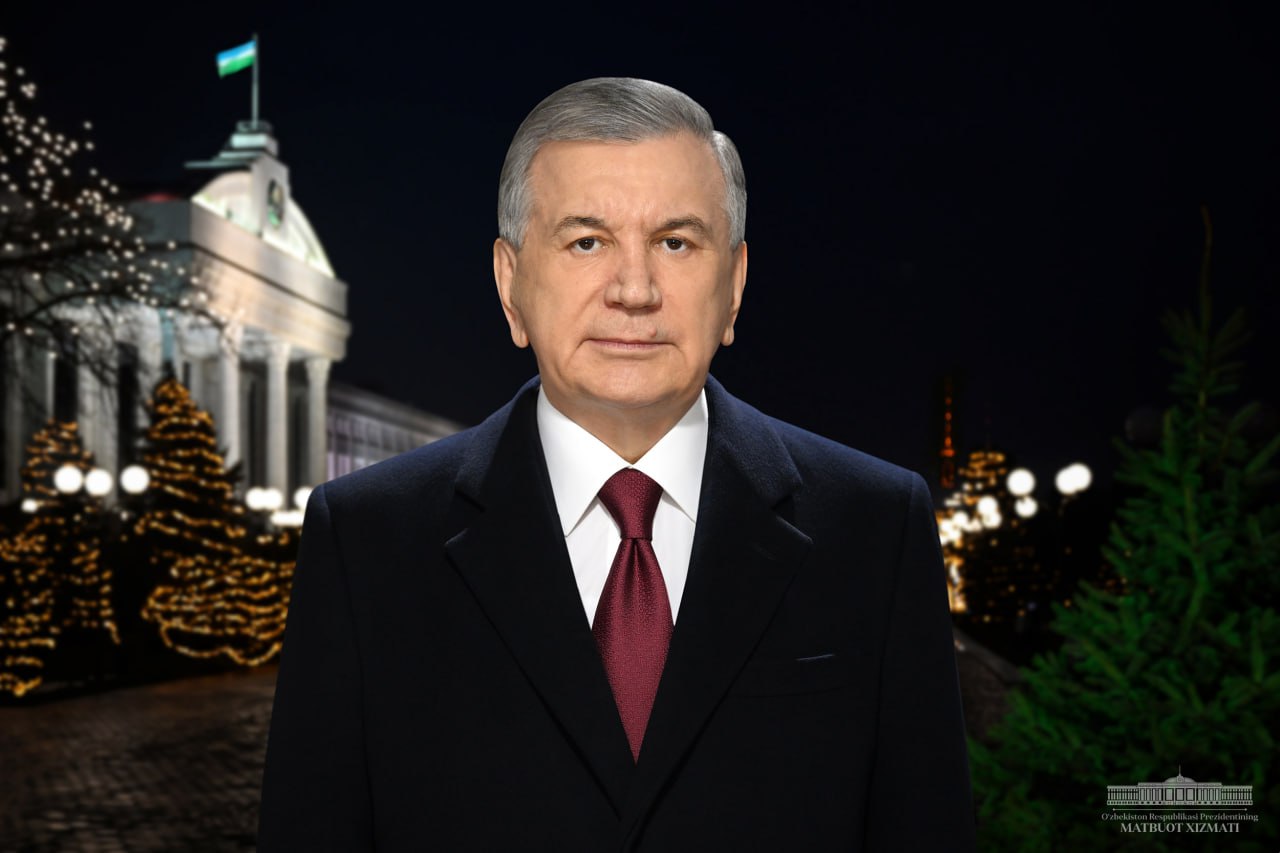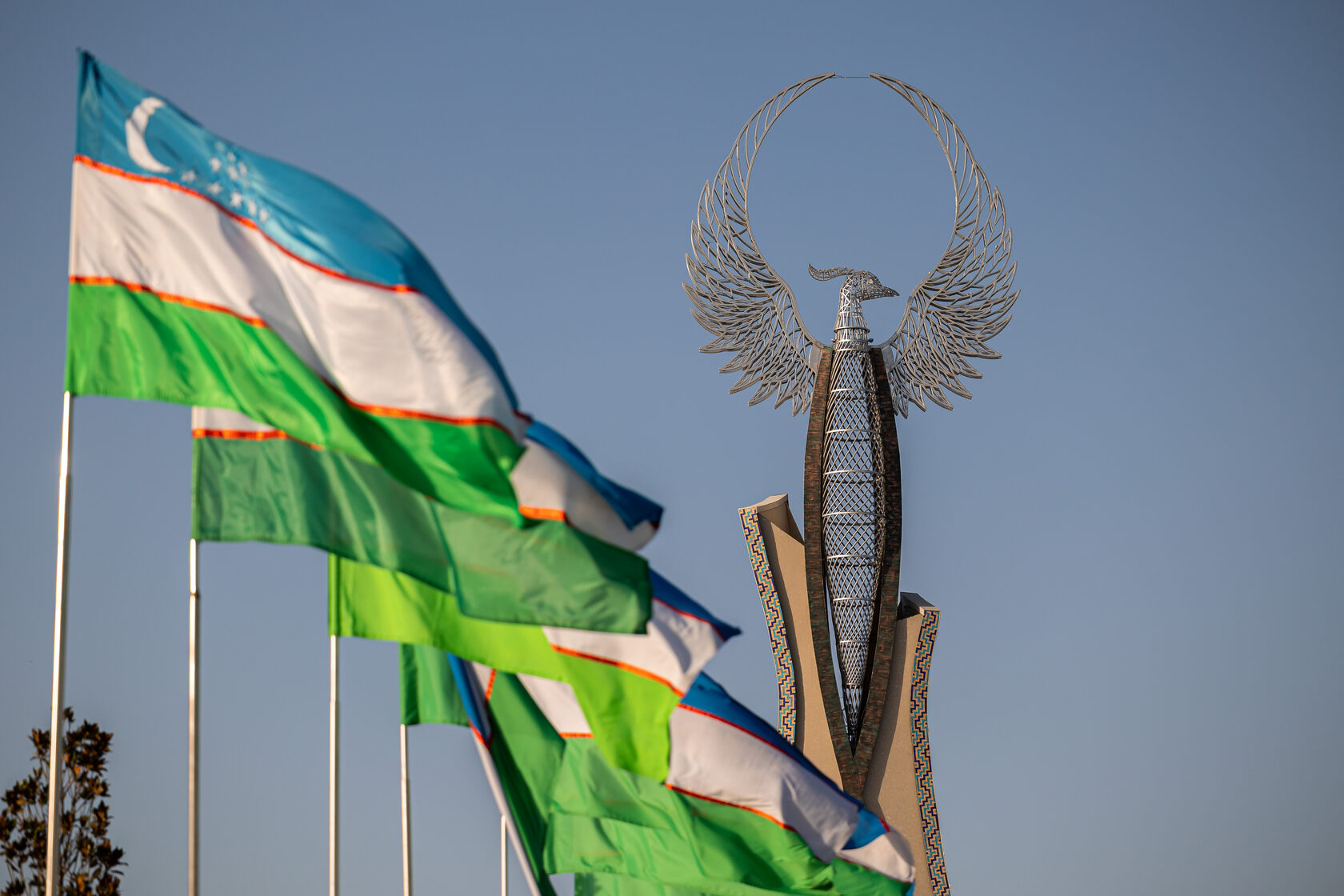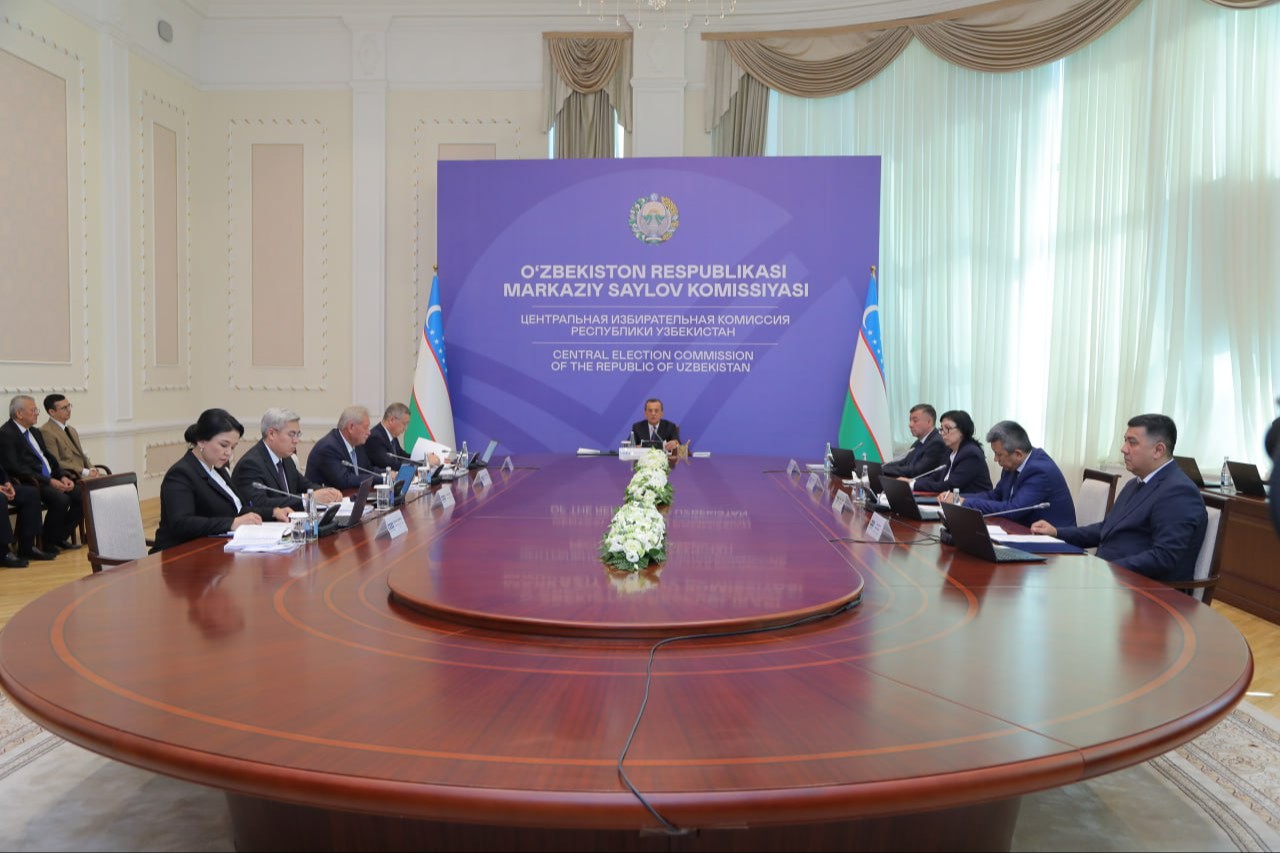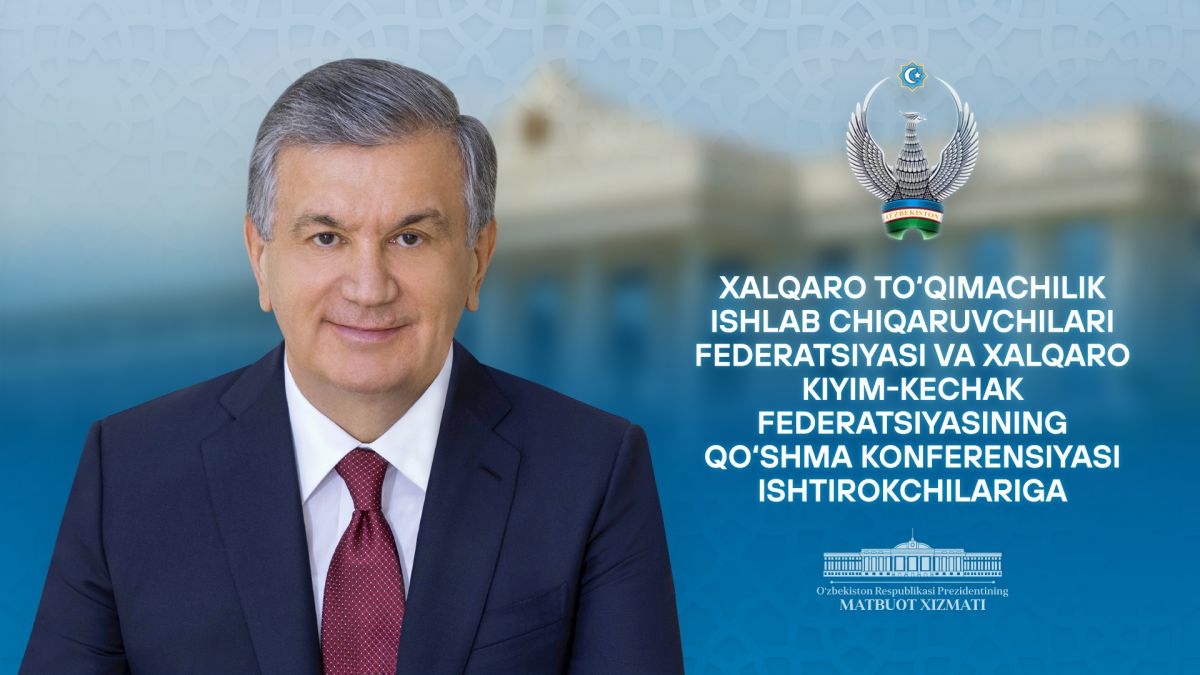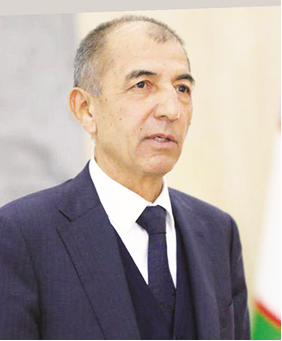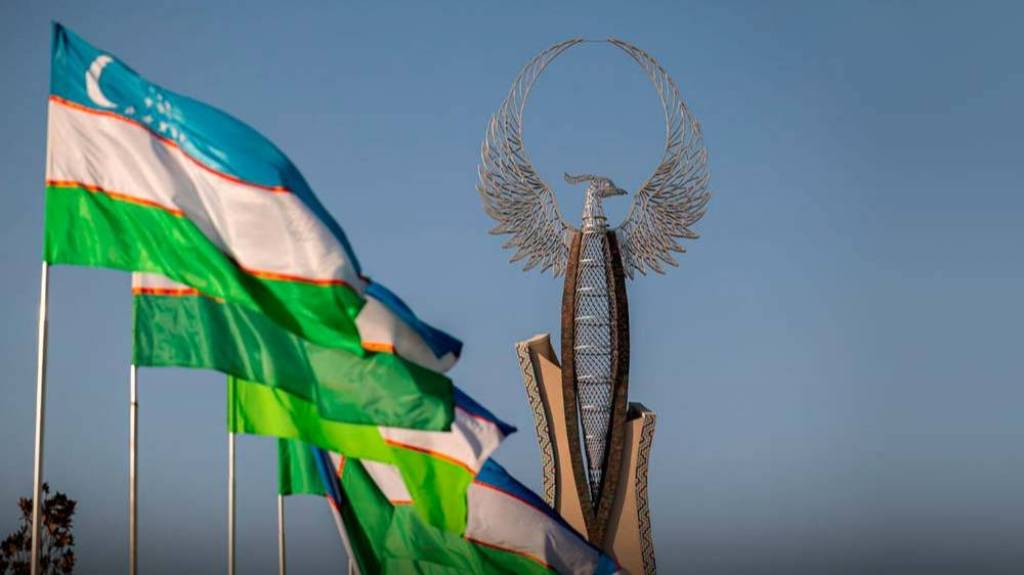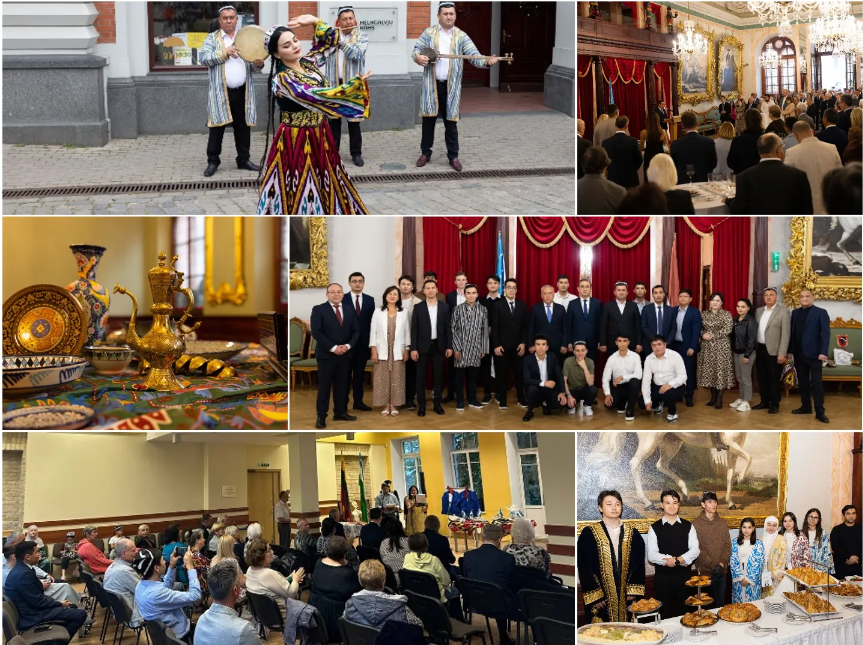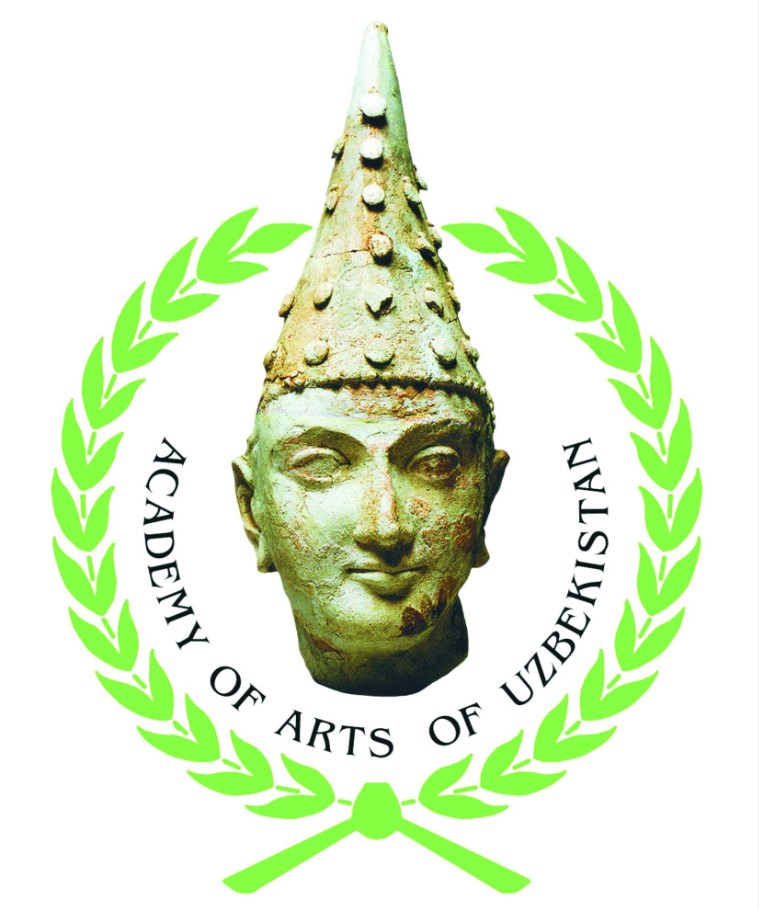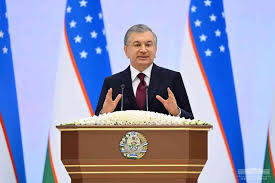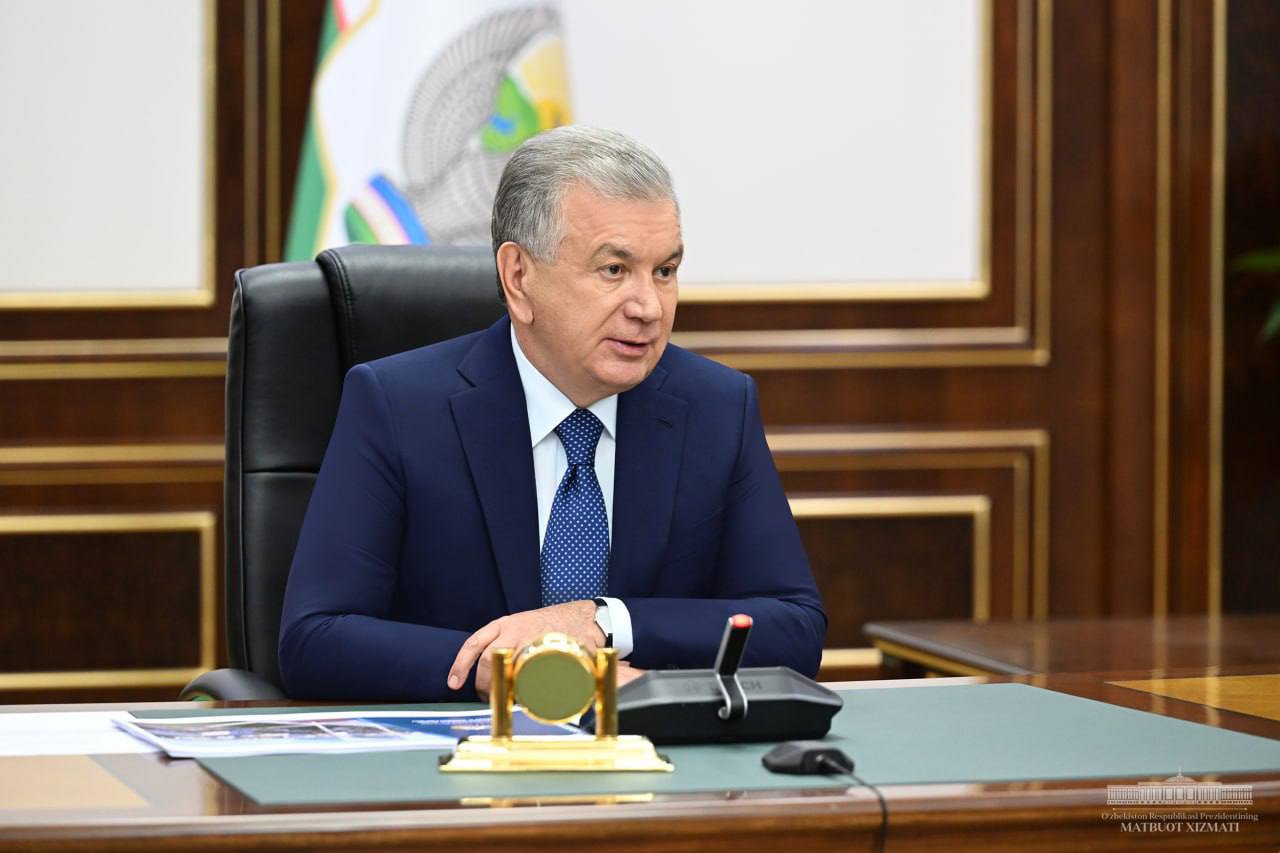Phone
Consular Issues
Phone
Uzbekistan news
We recommend
A New and Technological Approach to Elections Begins
📅 26.07.2024
The Central Election Commission held a meeting and a series of events today, July 26th. The primary agenda item was the preparation and high-level accomplishment of the upcoming elections for the Legislative Chamber of the Oliy Majlis and the Councils of People's Deputies in full compliance with the Constitution and laws.
According to Article 128 of the Constitution of the Republic of Uzbekistan, elections for the Legislative Chamber of the Oliy Majlis and the Councils of People's Deputies are scheduled to take place on the first Sunday of the third ten-day period of October in the year their term expires. Considering that the term of the deputies of the Legislative Chamber of the Oliy Majlis and the Councils of People's Deputies ends in 2024, the elections will be held on October 27th of this year, and the election campaign will begin on July 26th, as decided by the Central Election Commission.
These elections mark a significant departure from the past, taking place in a new socio-political environment as stipulated by our Constitution. The meeting underscored the unique features of these elections, which include:
- For the first time in Uzbekistan's history, the Legislative Chamber of the Oliy Majlis elections will be conducted using a mixed electoral system, combining majoritarian and proportional systems. This significant change will see seventy-five deputies elected directly through the majoritarian system, where voters vote for specific candidates. The remaining seventy-five deputies will be elected based on votes cast for political parties under the proportional system.
- One of the most significant advancements is the full digitization of election commissions' activities at all levels and their interactions with participants in the election process. This development significantly reduces bureaucracy, time, and document handling in election procedures, ushering in a new era of efficiency in our electoral system.
- Our election legislation has been fundamentally improved to align with advanced democratic standards. These improvements include introducing a new system for election bodies led by the Central Election Commission and requiring political parties to ensure that at least 40% of their candidates for deputy positions are women. Additionally, a candidate must receive a relative majority of votes to be elected. If a candidate gets more votes than other candidates in their respective electoral district, they will be elected without needing a repeat vote.
- The elections are taking place in conditions of significantly strengthened parliamentarianism and the powers of representative bodies at the local level, as established by the Updated Constitution. Specifically, the absolute powers of the Legislative Chamber have increased from 5 to 12, and those of the Senate from 12 to 18. The parliament's oversight functions over the activities of executive, judicial, law enforcement agencies, and special services have been expanded. The institution of hokims leading local Councils of People's Deputies is being abolished. To enhance the role of representative bodies in resolving important state issues, 33 powers previously held by hokims have been transferred to local Councils.
The meeting underscored the significance of these elections as a vivid example of democratic state-building in our country and an essential means for citizens to exercise their constitutional rights to vote and be elected to democratic state bodies. The elections will involve the election of 150 deputies to the Legislative Chamber, 65 members to the Senate, 65 deputies to the Jokargy Kenes of the Republic of Karakalpakstan, deputies to 208 district (city) Councils in the regions and Tashkent city, with around 30,000 candidates and nearly 90,000 trusted representatives actively participating. Over 120,000 election commission members and more than 70,000 citizens and international observers are expected to participate in the election process.
Considering the important role of elections in state life and with the aim of widely engaging citizens in this process, the Central Election Commission announced that the elections will be held on October 27th under the slogan “My Choice—My Prosperous Homeland.”
The 'E-Saylov' information system is a key tool in making the election process more transparent and accessible. It facilitates around 60 interactions between election commissions, political party candidates, observers, and the media entirely electronically. Integrated with other electronic platforms, the system automates many procedures in the election process without human intervention. This system forms an extensive database of nearly 400,000 participants in the election process, including election commission members, candidates, and observers. Around 32,000 participants will professionally use the information system, which includes communication through 40 types of SMS notifications.
For citizens, the "E-Saylov" information system introduces several conveniences in obtaining election-related information. Specifically, it provides statistical data on voters and polling stations, information on candidates for various elections, and interactive maps to learn about candidates and their biographies.
The meeting emphasized that the "E-Saylov" information system represents a new level of technological advancement and transparency in elections.
It was also noted that according to Article 37 of the Election Code, political parties have the right to nominate candidates for deputies to the Legislative Chamber and local Councils.
To participate in the elections, political parties must have been registered by the Ministry of Justice at least four months before the announcement of the election campaign and collect at least 40,000 signatures supporting their participation.
Additionally, the meeting approved a calendar plan to ensure that the activities related to conducting the elections are carried out step-by-step within the timelines specified by election legislation. The Central Election Commission, as an impartial and independent constitutional body, will take all necessary measures to prepare for and conduct the upcoming elections in full compliance with national legislation and international election standards, ensuring the process is open and transparent.
A Press Center has also been established under the Central Election Commission.
Central Election Commission
of the Republic of Uzbekistan
New Year greetings to the people of Uzbekistan
📅 01.01.2025
Dear compatriots!
I cordially congratulate you, the multinational people of Uzbekistan on the coming New Year 2025.
Despite the difficult situation in the world, the outgoing year has been prosperous for our country.
Thanks to the selfless labor, socio-political activity of our people, the idea of New Uzbekistan is becoming a reality.
The past elections to the Oliy Majlis and local councils have reaffirmed that we have entered a new stage of democratic reforms.
New high-tech industrial complexes, infrastructure and logistics networks, roads and railroads have been built in the country, business, IT and tourism spheres are developing. The incomes and quality of life of the population are increasing.
Our skillful dehkans and farmers, clusters have harvested rich crops. The whole country is being improved.
Kindergartens and schools, universities, cultural and sports facilities are being built. Thousands of our compatriots are welcoming the New Year in new homes.
Our energetic, enterprising young people are achieving success in all spheres. Their record achievements at the Olympic and Paralympic Games have opened a new page in the history of national sport.
The role and influence of civil society institutions, including the mahalla, are being strengthened. The sphere of spirituality and enlightenment is developing. Our country's initiatives of global significance are receiving broad support.
Uzbekistan's authority in the international arena as a competitive country and a reliable partner is growing.
All this has become possible thanks to sustainable development, the atmosphere of friendship and harmony in our society.
On this festive evening, I express my sincere gratitude to you, my dear ones, to all our people-creators for your conscientious labor and service to the Motherland.
Dear friends!
We have declared 2025 the Year of Environmental Protection and Green Economy.
Our main goal is to create a sustainable balance between the economic system and our environment. We will create even greater business opportunities.
We will resolutely continue to work to ensure the inviolability of private property and actively attract foreign investment.
The focus will be on the social sphere, increasing wages, pensions, scholarships and benefits.
We will mobilize all forces and opportunities to bring up our children harmoniously developed, with modern knowledge and professions.
We will increase attention to the development of science, education, health care, culture, art and sports.
We will continue to prioritize the care of veterans, women and youth, as well as improving the effectiveness of social protection.
We will raise to a new level the work on strengthening the potential of our Armed Forces, support for servicemen and their families.
In a word, all together, united, we will act to realize the main principle - “In the name of man, in the name of his happiness!”.
Dear friends!
Once again, I sincerely congratulate you - our compatriots abroad, as well as partners and friends of Uzbekistan around the world - on this wonderful holiday.
I wish you health, happiness, prosperity and well-being to every family, to our beloved Motherland!
May all our good dreams and hopes come true!
May our native Uzbekistan prosper!
Happy New Year to you, my dear ones!
Shavkat Mirziyoyev,
President of the Republic of Uzbekistan
How new mechanisms for regulating labor migration work in Uzbekistan
📅 26.07.2024
Labor force migration is a natural process worldwide. In Uzbekistan, purposeful work is being carried out to safely and orderly send such citizens abroad. The Agency for External Labor Migration has sent 70,000 people to developed countries for this purpose in the past two years.
We all know that those who want to work abroad also incur certain expenses. Therefore, migrants partially reimburse the costs of a work visa, travel ticket, foreign language, and qualification assessment. It is established that a citizen who has obtained international or equivalent certification in a foreign language is reimbursed 50% of the language learning costs.
Among all the positive work carried out in this area, there is a noted development of significant cooperation with the International Organization for Migration in protecting migrant rights, as well as with developed countries. Systematic work is underway to develop the Concept of the State Policy of the Republic of Uzbekistan in the field of migration until 2030, envisaging the achievement of criteria for guaranteed equality in the social protection of labor migrants.
Emphasizing that the Ministry of Employment and Labor Relations has established contracts between the External Labor Migration Agency and 25 German companies, Uzbek citizens are being temporarily employed in various fields. Discussions are also underway with another five companies. In the past three years alone, 821 Uzbek citizens have been sent to Germany for temporary work, while 1,670 citizens are currently undergoing training to continue their work activities in this country.
In this way, cooperation in the field of labor migration between Uzbekistan and Germany is actively developing, ensuring the preparation of our citizens for work, providing professional training and language learning opportunities, and creating favorable conditions for employment.
The External Labor Migration Agency has been holding discussions on labor migration issues with several countries in 2024, such as Great Britain, Hungary, and Slovakia, highlighting the increasing importance of these efforts.
In addition to the above, under the initiative of President Shavkat Mirziyoyev, each returning labor migrant is provided with a subsidy of 500,000 soums per month from the Labor Support Fund for one year. It is estimated that approximately 100 billion soums will be allocated to these measures for a year.
Assisting returning migrants in finding employment is also being considered as an important issue, and based on the Saykhunabad experience, financial support is provided for the production of goods and income generation, as well as other types of labor services. Medical facilities may also provide free medical checks for returning migrants and their family members. Additionally, starting from October 15, 2023, "Inson" Social Service Centers have been established in the Republic of Uzbekistan to provide social assistance to children whose parents work abroad, which is a significant step.
It is important to note that today, not only state organizations but also non-governmental organizations play a significant role in regulating and supporting labor migration. In this regard, it is relevant to mention educational courses and service organizations providing assistance in collaboration with the External Labor Migration Agency.
In short, a safe, orderly, and legal system for labor migration has been established in Uzbekistan, creating new mechanisms for citizens wishing to go abroad. It encompasses three main stages: The first stage involves organizing preparatory work for citizens intending to work abroad. Vocational and language training is conducted in 14 "Job Placement" service centers nationwide, 30 vocational training centers, 136 communities, 24 colleges, and 13 technical colleges.
Second stage: Providing legal and social assistance to labor migrants abroad. For this purpose, agencies dealing with labor migration issues have been established in several countries to provide services to Uzbek citizens working abroad. Labor Migration Affairs Attachés have been appointed at Uzbekistan's Embassies.
Third stage: Assisting in the reintegration of labor migrants returning to Uzbekistan. Inspectors at the Labor Support Centers are engaged in activities aimed at the reintegration of labor migrants returning to the country.
In conclusion, it is essential to emphasize that appropriate measures are being taken to ensure suitable working conditions and social protection for Uzbek citizens engaged in labor activities abroad. Collaboration with our foreign partners continues on all relevant migration issues. Systematic efforts are being made to further develop initiatives related to the professional orientation and language proficiency of labor migrants.
Bobomurod Yarashev,
teacherof the University of
Public Safety of the Republic of Uzbekistan
A New and Technological Approach to Elections Begins
📅 30.07.2024
The Central Election Commission held a meeting and a series of events today, July 26th. The primary agenda item was the preparation and high-level accomplishment of the upcoming elections for the Legislative Chamber of the Oliy Majlis and the Councils of People's Deputies in full compliance with the Constitution and laws.
According to Article 128 of the Constitution of the Republic of Uzbekistan, elections for the Legislative Chamber of the Oliy Majlis and the Councils of People's Deputies are scheduled to take place on the first Sunday of the third ten-day period of October in the year their term expires. Considering that the term of the deputies of the Legislative Chamber of the Oliy Majlis and the Councils of People's Deputies ends in 2024, the elections will be held on October 27th of this year, and the election campaign will begin on July 26th, as decided by the Central Election Commission.
These elections mark a significant departure from the past, taking place in a new socio-political environment as stipulated by our Constitution. The meeting underscored the unique features of these elections, which include:
- For the first time in Uzbekistan's history, the Legislative Chamber of the Oliy Majlis elections will be conducted using a mixed electoral system, combining majoritarian and proportional systems. This significant change will see seventy-five deputies elected directly through the majoritarian system, where voters vote for specific candidates. The remaining seventy-five deputies will be elected based on votes cast for political parties under the proportional system.
- One of the most significant advancements is the full digitization of election commissions' activities at all levels and their interactions with participants in the election process. This development significantly reduces bureaucracy, time, and document handling in election procedures, ushering in a new era of efficiency in our electoral system.
- Our election legislation has been fundamentally improved to align with advanced democratic standards. These improvements include introducing a new system for election bodies led by the Central Election Commission and requiring political parties to ensure that at least 40% of their candidates for deputy positions are women. Additionally, a candidate must receive a relative majority of votes to be elected. If a candidate gets more votes than other candidates in their respective electoral district, they will be elected without needing a repeat vote.
- The elections are taking place in conditions of significantly strengthened parliamentarianism and the powers of representative bodies at the local level, as established by the Updated Constitution. Specifically, the absolute powers of the Legislative Chamber have increased from 5 to 12, and those of the Senate from 12 to 18. The parliament's oversight functions over the activities of executive, judicial, law enforcement agencies, and special services have been expanded. The institution of hokims leading local Councils of People's Deputies is being abolished. To enhance the role of representative bodies in resolving important state issues, 33 powers previously held by hokims have been transferred to local Councils.
The meeting underscored the significance of these elections as a vivid example of democratic state-building in our country and an essential means for citizens to exercise their constitutional rights to vote and be elected to democratic state bodies. The elections will involve the election of 150 deputies to the Legislative Chamber, 65 members to the Senate, 65 deputies to the Jokargy Kenes of the Republic of Karakalpakstan, deputies to 208 district (city) Councils in the regions and Tashkent city, with around 30,000 candidates and nearly 90,000 trusted representatives actively participating. Over 120,000 election commission members and more than 70,000 citizens and international observers are expected to participate in the election process.
Considering the important role of elections in state life and with the aim of widely engaging citizens in this process, the Central Election Commission announced that the elections will be held on October 27th under the slogan “My Choice—My Prosperous Homeland.”
The 'E-Saylov' information system is a key tool in making the election process more transparent and accessible. It facilitates around 60 interactions between election commissions, political party candidates, observers, and the media entirely electronically. Integrated with other electronic platforms, the system automates many procedures in the election process without human intervention. This system forms an extensive database of nearly 400,000 participants in the election process, including election commission members, candidates, and observers. Around 32,000 participants will professionally use the information system, which includes communication through 40 types of SMS notifications.
For citizens, the "E-Saylov" information system introduces several conveniences in obtaining election-related information. Specifically, it provides statistical data on voters and polling stations, information on candidates for various elections, and interactive maps to learn about candidates and their biographies.
The meeting emphasized that the "E-Saylov" information system represents a new level of technological advancement and transparency in elections.
It was also noted that according to Article 37 of the Election Code, political parties have the right to nominate candidates for deputies to the Legislative Chamber and local Councils.
To participate in the elections, political parties must have been registered by the Ministry of Justice at least four months before the announcement of the election campaign and collect at least 40,000 signatures supporting their participation.
Additionally, the meeting approved a calendar plan to ensure that the activities related to conducting the elections are carried out step-by-step within the timelines specified by election legislation. The Central Election Commission, as an impartial and independent constitutional body, will take all necessary measures to prepare for and conduct the upcoming elections in full compliance with national legislation and international election standards, ensuring the process is open and transparent.
A Press Center has also been established under the Central Election Commission.
Central Election Commission
of the Republic of Uzbekistan
To the participants of the joint conference of the International Federation of Textile Manufacturers and the International Association of Apparel Manufacturers
📅 10.09.2024
Dear participants of the conference!
Ladies and gentlemen!
First of all, from the bottom of my heart, I sincerely congratulate you, my dear ones, on the opening of today's prestigious event - the joint conference of the International Textile Federation and the International Association of Apparel Manufacturers.
I would like to express my special gratitude to the President of the International Federation of Textile Manufacturers Mr. Kei Vi Srinavasan and President of the International Association of Apparel Manufacturers Mr. Chem Altan for the fact that this joint conference is being held in Uzbekistan for the first time.
At the same time, I express my sincere gratitude to the high-ranking representatives of the industry, heads of prestigious international and regional organizations participating in this conference.
Welcome to the pearl of the ancient Great Silk Road, the land of craftsmen - the majestic city of Samarkand!
Dear participants of the conference!
In recent years we have taken decisive steps to radically improve the investment and business environment, create favorable conditions for foreign and domestic investors.
As in all spheres and sectors, we have been implementing large-scale reforms in the textile and garment industries.
First of all, the state monopoly in cotton cultivation has been abolished, and a cluster system has been created and is being consistently improved, covering the entire process from raw material procurement to the production of finished goods.
Our reforms in this area have won the recognition of prestigious international organizations, and the boycott of Uzbek cotton has been lifted. Our cooperation with the international coalition “Cotton Campaign” continues in this direction.
At the same time, as a result of creating a stable legislative framework, improving the investment environment and introducing new technologies, the volume of cotton fiber processing increased from 40 percent in 2017 to 100 percent. At the same time, the work on import of cotton raw materials and production of finished products with high added value began.
Thanks to the opportunities created in the sphere, the volume of textile production has increased 5 times, its export - 4 times.
The most important thing is that earlier a significant part, i.e. 70 percent of exports in the sector, was accounted for raw materials, while today 60 percent of exported goods are finished products.
In the first years of reforms, we identified as a priority task the development of human capital, training of the population, especially young people and women, in professions, training of qualified personnel for all sectors, and these issues will continue to be in the center of our attention.
Decent working conditions that meet international requirements are created for the employees of enterprises, and the “Better Work” and “Better Cotton” programs are systematically implemented.
Particular attention is paid to ensuring labor rights and providing full support to over 600,000 workers.
At the same time, decisive measures are taken to create national brands, attract prestigious international and foreign trademarks to our country.
Authoritative participants of the world market, such as “Teamdress” (Germany), “Cotonella” (Italy), “Indorama” (Singapore), “Posco International” and “Gwangyang” (South Korea) are effectively operating in the country.
Uzbekistan's textile industry is being actively integrated into global production processes, and the number of our reliable partners on all continents of the world is increasing.
It should be noted that long-term cooperation with foreign investors and international brands, increasing production of high value-added products, bringing national brands to the international level will remain our priorities in the textile industry in the future.
I am convinced that today's conference will serve as an effective platform for further strengthening and expanding cooperation in this area on an international scale, sharing best practices and ideas.
I hope it will contribute to further expansion of mutually beneficial cooperation between representatives of more than 500 national and international organizations, manufacturers and retailers participating in the conference, and will bring the development of the industry to a qualitatively new level.
We highly appreciate and support all mutually beneficial initiatives of our foreign partners. In particular, we are ready to provide all possible assistance in introducing the necessary standards for international brands to enter Uzbekistan.
We are ready to create all necessary conditions for prestigious international organizations to regularly hold conferences, exhibitions and fashion shows in our country, particularly in such cities as Bukhara, Khiva, Shakhrisabz, Margilan, Kokand, Namangan, Andijan, which have high tourism and industrial potential.
I am confident that the ancient history, rich cultural heritage of our country, meetings with our hard-working and generous people will make an indelible impression on you, and the huge socio-economic potential of our regions will encourage investors to implement new projects.
I congratulate you once again on the opening of the prestigious conference that is starting today and wish you all good health, happiness and prosperity, success in the fruitful work of the conference.
Shavkat Mirziyoyev,
President of the Republic of Uzbekistan
The text of the article is in Uzbek!
📅 25.07.2024The text of the article is in Uzbek!
RELIGIOUS TOLERANCE AND INTERFAITH HARMONY IN UZBEKISTAN
📅 06.11.2025
The declaration of independence and the commitment of the Government of Uzbekistan to the ideals of democracy, the choice of a secular path of development of society have gradually made it possible to create equal legal conditions for the existence of religions in general and religious groups in particular.
In the religious sphere, this large-scale work is carried out by the relevant state bodies and civil society institutions and is aimed at ensuring citizens' constitutionally guaranteed right to freedom of conscience; strengthening religious pluralism, tolerance and interfaith dialogue.
One of the significant results of joint work is the adoption in December 2018 by the UN General Assembly of a special resolution "Enlightenment and Religious Tolerance".
The adoption of the resolution was a practical implementation of the initiative of the President of the Republic of Uzbekistan Shavkat Mirziyoyev, put forward at the 72nd session of the UN General Assembly. The main goal of the proposed resolution is "to ensure universal access to education, the elimination of illiteracy and ignorance."
It is noteworthy that the resolution was not only unanimously supported by all UN member states, but also adopted with the co-authorship of over 50 countries. This testifies to the high recognition by the international community of the relevance and timeliness of the initiative of the President of Uzbekistan.
In recent years, significant changes have taken place in Uzbekistan and large-scale reforms have been implemented in many areas, including in the religious and educational sphere.
A number of legislative acts have been adopted aimed at further improving activities in the religious sphere.
In order to deepen the study of Islam and teach its scientific foundations, the International Islamic Academy of Uzbekistan was created. The Academy specializes in teaching secular and religious knowledge, training qualified personnel in the interpretation of the Koran, Islamic law, religious dogmas and hadiths.
In Uzbekistan, unique mechanisms are used to revive national and religious values, study and promote the rich scientific and spiritual heritage of great ancestors, and strengthen religious tolerance in society. The activities of the Center for Islamic Civilization, international research centers of Imam Bukhari, Imam Termizi, Imam Maturidi, Bahauddin Naqshbandi have been established.
As a result of large-scale reforms and transformations carried out in the religious sphere, the Higher Madrasah Mir Arab in Bukhara, the School of Hadith Studies in Samarkand, the Madrasah of Imam Termizi and the Islamic Institute named after Imam Termizi in Termez began their activities.
In addition, the Charitable Public Fund "Vakf" was established under the Office of Muslims of Uzbekistan, whose tasks include financing work on the reconstruction of mosques, holy places of pilgrimage and visits, other objects, providing material and technical support and providing material support to employees in this field. The Fund received the opportunity to dispose of funds coming to 3 accounts: charitable, vakf and zakat (ushr, fidya, fitr).
In accordance with the adopted legislative acts, in order to further improve the activities of the Committee on Religious Affairs, a new composition of the Council for Religious Affairs has been approved, which is a public advisory body under the Committee.
The activities of the Council are inextricably linked with ensuring freedom of religion in the country, respecting the rights of religious organizations and believers. The initiatives of the members of the Council are fully implemented within the framework of measures taken by the country's leadership in the field of protecting and further strengthening the rights and freedoms of religious movements.
The significance and timeliness of the measures taken by the country's leadership served as the basis for holding the international forum "Dialogue of Declarations" in Tashkent, Samarkand and Bukhara on May 16-20, 2022. This event was part of the systematic and consistent efforts of Uzbekistan to practically implement the principles and provisions enshrined in the Special Resolution of the UN General Assembly "Enlightenment and Religious Tolerance", adopted in 2018 on the initiative of President Shavkat Mirziyoyev.
It is especially worth noting that at the past 76th session of the UN General Assembly, the "Bukhara Declaration" adopted following the results of this forum was recognized as an official UN document. As an official UN document, the document has been translated into 6 languages and distributed among the UN member states, as well as specialized agencies of the organization.
The second round of the international forum will be held on September 10-13, 2025 with the assistance of several NGOs from the USA. The participants of the event also visited Samarkand, where they got acquainted with the activities of the reconstructed complex of Imam Bukhari.
Uzbekistan has special dates that are closely related to the religious life of believers: these are "Day of Friendship of Peoples", celebrated on July 30, and "International Day of Tolerance", celebrated on November 16. Both of these dates are marked not only by holding events, but also by awarding the corresponding badges - the badge "Khalklar dustligi" ("Friendship of Peoples") has been awarded since 2021, and the badge "Diniy bagrikenklik" ("Religious Tolerance") began to be awarded to distinguished citizens since 2023. Among the awardees are representatives of various religious denominations of Uzbekistan.
At the same time, Uzbekistan attaches great importance to the preservation of religious and spiritual heritage, the enrichment of existing funds, the creation of necessary conditions for local and foreign researchers to work with historical sources, and the comprehensive study of historical and cultural heritage.
Today, in the country, in order to ensure interethnic and interfaith harmony in society, a legislative framework has been created that provides for the observance of the rights and legitimate interests of citizens.
The Constitution of the Republic of Uzbekistan enshrines the norm on freedom of religion for every person. Attention is also paid to improving and liberalizing national legislation in the field of religion. The procedures for obtaining permission for the production, import and distribution of religious literature have been simplified. The procedure for state registration of religious organizations has been further optimized.
Currently, the new Law "On Freedom of Conscience and Religious Organizations" is in force, which contributes to ensuring the constitutional rights of citizens of the country to freedom of conscience and religion.
Noting the fundamental innovations in the Law as a consistent continuation of large-scale reforms in the religious and educational sphere, special attention should be paid, first of all, to the creation of favorable conditions for ensuring freedom of conscience for every person, and clarifying law enforcement practice.
Currently, 2373 religious organizations of 16 religious denominations operate in Uzbekistan. Of these, Muslim organizations - 2174, which is 92 percent of the total number.
There are also 181 Christian organizations, 8 Jewish communities, 7 Baha'i communities, one Krishna society and one Buddhist temple, as well as the interfaith Biblical Society of Uzbekistan operating in Uzbekistan.
Recently, 134 religious organizations have been registered in Uzbekistan, including 3 higher and one secondary specialized Islamic educational institutions in Bukhara, Samarkand and Termez, 105 mosques and 25 non-Islamic organizations of 7 different religious denominations.
At the same time, the national legislation of Uzbekistan does not provide for any restrictions on the number of religious organizations or the terms of their registration.
Religious organizations operating in the republic, along with other public organizations, actively participate in spiritual and educational work, make a significant contribution to improving the spirituality of society, and forming strong beliefs in young people based on patriotism, as well as interfaith and interethnic tolerance.
It should be noted that religious policy in Uzbekistan is based on the principles of the secular nature of the state, religious tolerance and equal treatment of all religions. In the republic, representatives of various nations and ethnic groups professing Islam, Christianity, Buddhism, Judaism and other religions carry out their activities on equal terms.
All conditions have been created for adherents of each denomination, allowing them to freely and unhindered practice their religion.
Believers freely pray in mosques, churches, synagogues, observe fasting, and also make pilgrimages. Religious organizations have the right to own territory, publish literature, train their religious ministers, and organize pilgrimages to holy places.
The freedom of religion guaranteed by the national legislation of Uzbekistan has created all the necessary conditions for meeting the religious needs of all citizens - representatives of 136 national and ethnic groups.
Representatives of different faiths freely celebrate all religious holidays. Thus, from year to year, Kurban-Hayit and Ramadan-Hayit are celebrated on an increasingly large scale among Muslims, Easter and Christmas - among Christians, Pesach, Purim and Hanukkah - among Jews, Navruz - among Baha'is, as well as celebrations dedicated to Buddha and Krishna and other major events.
Believers make pilgrimages to holy places: Muslims to Saudi Arabia to perform the Hajj and Umrah rituals, Christians - to Russia, Greece and Israel, Jews - to Israel.
Over the years of independence, more than 484 thousand Muslims have made pilgrimages to Saudi Arabia, including 188 thousand - Hajj and 296 thousand - Umrah, more than 3.2 thousand Christians and Jews have visited religious shrines in Israel, Russia, Turkey, Italy, Georgia, Greece.
To meet the spiritual needs of society, a large number of religious literature of various orientations is published annually. To fully cover the religious life of Uzbekistan, a number of newspapers and magazines are published, including the newspapers "Islom nuri", "Slovo zhizni", the magazines "Khidoyat", "Vostok svyshe".
Today, in Uzbekistan, on a systematic basis, a set of measures is being carried out to protect the population from the negative influence of destructive ideas that reflect radical extremist ideology and religious fanaticism.
An important step in this direction was the application of acts of pardon. In particular, since 2017, 29 decrees of the President of the Republic of Uzbekistan have been adopted on pardoning persons who have committed crimes.
It should be noted that in recent years, within the framework of the consistent policy pursued in Uzbekistan in the field of protecting the rights and freedoms of citizens, special attention is paid to measures aimed at protecting the rights, freedoms, honor and dignity not only of citizens residing in the republic, but also of our compatriots who find themselves in difficult life situations in foreign countries.
Unfortunately, some of our citizens, who have fallen under the influence of alien ideas, believing false promises, in different years joined the ranks of international terrorist organizations in armed conflict zones abroad. Spouses, fathers of some women returned as part of humanitarian operations, died in the course of armed clashes.
Given this circumstance, on the instructions of the President of Uzbekistan, five humanitarian actions "Mehr" were successfully carried out in 2019-2021, within the framework of which more than 500 citizens of the republic, mainly women and children, were returned to their homeland from the zones of armed conflicts in the Middle East and in Afghanistan.
In order to further assist in their speedy reintegration and rehabilitation, a set of measures has been implemented at the state level to provide timely medical, psychological, material and moral assistance. To date, all returnees have been provided with the necessary conditions for their adaptation to peaceful life and integration into society, access to educational and other social programs has been provided, including through the provision of housing and employment.
In general, it is worth noting that an important distinguishing feature of the religious life of modern Uzbekistan is the inadmissibility of establishing advantages or restrictions for one religion in relation to other denominations.
One of the main priorities of reforming society in order to ensure interethnic harmony and religious tolerance is to ensure and protect the rights and freedoms of citizens, their equality before the law regardless of race, gender, nationality, language, social origin, beliefs, religion, personal and social status, which are enshrined in the Constitution of Uzbekistan.
Uzbekistan consistently and steadily fulfills its international obligations in the field of ensuring religious freedoms within the framework of international human rights treaties.
As is known, Uzbekistan has acceded to more than 70 major international human rights instruments. Accession to these documents contributed to the creation of an effective human rights protection system in Uzbekistan.
It is important that Uzbekistan's policy in the field of religion, aimed at strengthening interfaith dialogue and religious tolerance in society, is an important factor of stability and security.
In conclusion, I would like to emphasize that the large-scale reforms being carried out in the country are a clear confirmation of the consistent continuation by the President of the Republic of Uzbekistan of the implementation of the principle "Everything in the name of man, in the name of his future."
Committee on Religious Affairs
Latvia and Lithuania held festive events in honor of the 33rd anniversary of our country's independence
📅 15.09.2024The text of the article is in Uzbek!
ACADEMY OF ARTS OF UZBEKISTAN. OPEN CALL
📅 08.07.2024
OPEN CALL
The Academy of Arts of Uzbekistan invites you to participate
at the X Tashkent International Biennale
of Contemporary Art,
which will be held from 14 to 18 October 2024 in the city of Tashkent (Uzbekistan). Can take part in the Biennale artists of various areas of contemporary art and present your work on the topic
“Art and World”.
In addition to the main exhibition, the biennale will host a number of artistic and cultural events, such as exhibitions, lectures and master classes, an international conference, and a tour of the cities of Uzbekistan.
All expenses of foreign participants for their stay (meals, internal transportation, accommodation) in Tashkent, except for flights,
will be covered by the Organizing Committee.
Applications for participation in the Biennale are accepted until August 15, 2024 via Google form:
https://forms.gle/aUEMyfrsyQUsrp7b7
(detailed information is given in the attachment to this letter)
*Organizers have the right to make changes to the event program
*Application requirements
X International Biennale of Contemporary Art
(Tashkent, Uzbekistan, October 14-18, 2024)
|
Age: |
No limits |
|
Country of residence: |
No limits |
|
Field of Art: |
All fields of art, Fine and Contemporary Arts |
|
Financial Conditions: |
All expenses of foreign participants for their stay (meals, internal transportation, accommodation) in Tashkent, except for flights, will be covered by the Organizing Committee. |
|
Application order: |
Applications for participation in the Biennale are accepted only via Google form: |
Requirements for Art Works
|
Executor: |
For participation, ArtWork could have one or more authors |
|
Material: |
No limits |
|
Selection critiries: |
The works made during the last 2 years should be submitted to the competition. In terms of theme and content, they should correspond to the thematic focus of this Biennale, be executed at a high professional level, be conceptual, and carry innovative processes of contemporary art. |
|
The procedure for providing information about creative work to the Organizing Committee: |
1) Detailed information of the Art Work will be provided to the Organizing Committee by filling appropriate graph in the online Google form; 2) All Author’s Art Works should be collected in one PowerPoint presentation file (electronic format). The presentation must include only names and photos of the work. 3) Author’s ArtWorks should be provided from four angles; 4) Photo criteries: -Format: JPEG (JPG) or PDF -Minimum resolution: 2048 × 1080 pixels -Maximum size: 2 MB 5) Received works will be checked by the Organizing Committee, and selected Art Works for Biennale would be provided to the authors. |
|
Delivery method to the venue of Biennale : |
1) Applicants from Uzbekistan: transportation of the Art Work to the venue of Biennale and back to destination carried out by the participant itself ; 2) Applicants from other countries: transportation of the Art Work to the venue of Biennale and back to destination must be carried as participants baggage (cost of the baggage should be included to the amount of the ticket) |
|
Requirements for the weight of the work(s), already packed (for foreign participants): |
up to 15 kg |
|
Requirements for the size of packed work (for foreign participants): |
up to 1 cu.m.
*The cost of baggage is no compensated by the Organizing Committee of Biennale |
|
Additional conditions: |
1) Participant is responsible for the quality of packed work and safety of the Art Work before unpacking at the destination in Uzbekistan; 2) Organizers are responsible for safety of the work for the period of Biennale; 3) Organizers are responsible for the quality of packed work and safety of the Art Work after unpacking at the destination after shipping it back to the country of destination. 4) Art works could be sold on a commercial basis after performing in the Biennale, regarding the agreement of each side. |
*The organizers have the right to make amendments
Linguistic Analysis of the President of the Republic of Uzbekistan’s 2026 State of the Nation Address
📅 02.01.2026
The analysis covers the key thematic and semantic emphases of the President’s speech, the structure of core concepts and their interrelations, priority directions of state policy, as well as the strategic benchmarks for the country’s socio-economic development in 2026.
On 26 December 2025, President Shavkat Mirziyoyev delivered his Address to the Oliy Majlis and the people of Uzbekistan. Experts of the Center for Economic Research and Reforms (CERR) conducted a linguistic content analysis of the President’s speech.
The analysis was carried out using modern linguistic methods and is aimed at identifying semantic priorities, key concepts and their connections. A word cloud and diagrams were also prepared to visually demonstrate the priority directions of state policy.
Analysis (from the original language)
In total, the President used 9,135 words in his Address. The creation of a word cloud made it possible to visualize the most significant themes and gain a deeper understanding of the priorities and directions of the country’s socio-economic development.
Figure 1. Most frequently used words in the President’s Address (26.12.2025)
The linguistic analysis showed that the most frequently used key words included “mahalla” – 49 times, “aholi” (population) – 35 times, “iqtisodiyot” (economy) – 28 times, “bozor” (market) – 26 times, “loyiha” (project) – 25 times, and “technology” – 22 times (Fig. 1).
Words such as “ta’lim” (education), “natija” (result) and “daromad” (income) were each used 20 times; “tadbirkor” (entrepreneur) and “sanoat” (industry) – 19 times each; “suv” (water) – 18 times; “elektr” (electricity) and “hudud” (territory) – 17 times each; “yoshlar” (youth), “infratuzilma” (infrastructure) and “qurilish” (construction) – 16 times each.
The analysis of two-word expressions showed that the phrase “Markaziy Osiyo” (Central Asia) was used eight times; “aholi daromadi” (household income), “qishloq xo‘jaligi” (agriculture) and “yangi bosqich” (new stage) – seven times; “yangi texnologiyalar” (new technologies) and “Toshkent shahri” (city of Tashkent) – six times each. Expressions such as “Davlat xizmatlari” (public services), “xorijiy investitsiya” (foreign investment) and “yangi tizim” (new system) were used five times, while “dual ta’lim” (dual education), “ish o‘rni” (jobs), “viloyat markazlari” (regional centers) and “tuman byudjeti” (district budgets) were used four times each.
Among three-word combinations, the most frequent expressions included “the next five years” – nine times; “based on dual education” – four times; and “water-saving technologies” and “water, electricity” – three times each.
Thus, the analysis shows that at the core of state policy are the mahalla, public welfare, and the transition to a new stage of development based on economic and technological transformation, with clearly defined strategic objectives for the next five years.
Thematic structure of the speech
The diagram below shows the distribution of the speech’s vocabulary by key directions, where the content is grouped into nine main thematic blocks.
The diagram clearly demonstrates that technological development and human interests, implemented at the level of the mahalla, are at the center of state policy. The ultimate goal of all reforms is to ensure public welfare through sustainable economic growth (Fig. 2).
Figure 2. Distribution of words by thematic areas in the structure of the speech
Interconnection of development directions
The analysis highlights key words that demonstrate the interconnection between various directions of Uzbekistan’s state policy in the coming years.
The transition of the economy to a technological and innovation-based growth model is a central element of state policy and implies a shift away from a raw-materials model toward high-tech industry. This direction is closely linked with such concepts as “investment,” “technology,” “market,” and “product.”
The block on economic growth and welfare reflects the key outcomes of reforms, including the increase of the economy to $145 bn and a twofold reduction in poverty over the past three years. It is directly associated with the concepts of “population,” “economy,” “mahalla,” and “services.”
The social foundation of reforms is built through the development of the mahalla and social solidarity. This direction is associated with “mahalla,” “youth,” “society,” and “values.”
Structuring vocabulary by thematic areas shows that the core of the President’s speech is technological modernization of the economy and a human-centered governance model based on the “mahallabay” system.
It emphasizes the interconnection between economic growth, improvement of public welfare and the development of local infrastructure, as well as priorities such as strengthening human capital, expanding employment and increasing the efficiency of public administration.
Figure 3. Interconnection of development directions
Among the highlighted semantic blocks are also tasks related to stimulating domestic demand, developing the housing and tourism sectors, modernizing the transport system, increasing productivity in agriculture and introducing water-saving technologies.
Special emphasis is placed on the “green” agenda, including the development of renewable energy, expansion of the “Yashil Makon” (“Green Space”) initiative, and strengthening resilience to climate risks.
In the foreign policy dimension, the analysis highlights Uzbekistan’s openness, strengthening of good-neighborly relations, and integration into the global economic system.
The linguistic analysis confirms that the idea at the core of the President’s speech is built around the triad “inson qadri – mahalla – farovonlik” (human dignity – mahalla – welfare), where the goal of reforms is sustainable growth, improved quality of life, and the further strengthening of Uzbekistan’s position.
Ilyos Rabbimov, CERR
CERR Public Relations Service
For inquiries, please contact:
(78) 150 02 02 (417)
Center for Economic Research and Reforms Ranks Uzbekistan’s Banking Sector
📅 22.01.2026
According to the CERR bank ranking results for 2025, the stable positions of most financial institutions indicate a higher competitiveness threshold across the sector. At the same time, a noticeable reshuffling has emerged within the mid-tier segment.
The Center for Economic Research and Reforms (CERR) presented an updated Bank Ranking based on the results of the Bank Activity Index for Q4 2025. The study covers 35 commercial banks of the republic, including 20 large financial institutions classified by scale and branch network, and 15 banks categorized as small. The methodology is based on the analysis of 27 indicators, benchmarked against national averages and international standards, including Basel Committee requirements. The ranking serves as an important tool for enhancing transparency and strengthening trust in the financial system. This approach is consistent with international practice and is used by leading financial institutions worldwide.
Financial results for Q4 2025
During the reporting period, total assets of the banking sector amounted to 892.9 trillion soums ($74.2 bn), while liabilities reached 759.8 trillion soums ($63.1 bn). Lending increased by 13%, while deposits grew by 31%. The share of foreign-currency transactions declined, indicating strengthening of the national currency. Net profit reached 13.5 trillion soums ($1.1 bn), which is 57.1% higher than a year earlier. Over the period under review, the share of non-performing loans decreased to 3.5% from 4.3% a year earlier, pointing to improved portfolio quality. At the same time, in some banks this indicator remains above the sector average. Capital adequacy ratios exceed minimum regulatory requirements by more than 1.4 times, confirming the resilience of the banking sector.
Activity ranking of large banks for Q4 2025
The results for Q4 2025 show that sector leaders have maintained stable positions, while reshuffling within the ranking remains limited. The most notable progress was demonstrated by SQB, which climbed three positions. Positive dynamics were also recorded by Davr Bank, Orient Finance Bank, Xalq Bank, and Ipoteka Bank, all of which improved their standings in the overall ranking. At the same time, only two large banks showed a decline in activity. Invest Finance Bank and Aloqa Bank fell by four and three positions in the overall ranking, respectively. Overall, 13 banks retained their positions in the activity ranking, which, amid intensifying competition, reflects the ability of institutions to maintain operational efficiency, adequate liquidity, asset quality, and financial stability.
Dynamics of key indicators
In financial intermediation, Tenge Bank and Ipak Yuli Bank showed a decline in efficiency in attracting and allocating resources, losing four and three positions, respectively. National Bank, Asia Alliance Bank, Anor Bank, BDB, and Mikrokreditbank also dropped by one position in this category. In terms of financial inclusion, a one-position decline was recorded for Orient Finance Bank, Xalq Bank, Agrobank, BDB, and Ipoteka Bank. Regarding asset quality, six large banks registered a decline. Agrobank lost three positions, while National Bank, Trast Bank, Anor Bank, Aloqa Bank, and Asaka Bank each lost two positions. Despite the overall positive profit dynamics in the sector, two banks posted a decline in profitability, namely National Bank and Anor Bank, which fell by two and one positions, respectively. In management efficiency, weaker positions were observed for Mikrokreditbank and Anor Bank, both down two positions. In terms of liquidity, almost one-third of all large banks in the country lost positions, with the sharpest decline recorded by Davr Bank, down six positions, while Agrobank closed the ranking, falling to the last position on this indicator.
Activity ranking of small banks for Q4 2025
In the group of small banks, relative stability persists. Leaders have retained their positions. The main changes in this category also occurred in the mid-tier segment, where several banks improved their standings due to growth in financial intermediation and higher profitability. In this group, six out of 15 financial institutions, including the ranking leader Universal Bank, retained their positions. At the same time, five banks recorded declines, with the largest drop observed at Ziraat Bank, which lost three positions, while Apex Bank rose by three positions in the overall ranking. AVO Bank and Madad Invest Bank each gained two positions, while Okto Bank gained one position and secured third place in the overall group ranking.
Jafar Khidirov,
Head of Banking and Financial Research Sector
Further tasks for the development of competition were discussed
📅 06.08.2024
On August 5, President Shavkat Mirziyoyev familiarized himself with the presentation of measures aimed at developing competition.
The ongoing efforts to reduce the state presence in the economy and curb large monopolies have a positive impact on the competitive environment. In particular, over the last five years the competitive environment has improved in more than 25 goods. Exclusive rights that restricted competition in 7 types of activities have been abolished. The number of enterprises with state participation decreased by 42 percent, while the number of private business entities increased by 1.6 times.
Last year the Law "On Competition" was adopted in a new version. The Committee for Competition Development and Consumer Protection was given additional effective powers. According to the studies conducted on this basis, in some organizations there are such phenomena as anticompetitive decision-making, direct contracts, use of dominant position in trade.
In this regard, a Competition Development Framework has been developed to enhance the coverage and effectiveness of competition in this area. This concept defines further tasks to reduce government involvement in the economy, liberalize market access and create a level playing field for entrepreneurs.
Thus, it is planned to abolish regulations and redundant requirements that impede the free access of business entities to markets. It is envisaged to introduce relaxations aimed at reducing the regulatory burden, in particular, permitting procedures and licenses will be replaced by compulsory liability insurance.
Independent market regulators will be introduced in the spheres of natural monopolies. The participation of natural monopoly entities will be limited in commodity markets related to natural monopolies and where there is an opportunity to develop competition.
The scale of direct public procurement will be reduced, and it will be completely switched to competitive methods. It is envisaged to abolish the provision of state aid of an individual nature that restricts competition, including exclusive rights, privileges, preferences and relaxations.
By means of mutual integration of information systems of state bodies, digital monitoring of all links in the chain of pricing of socially important products will be established. A system of non-disclosure and encouragement of persons who have provided information on cases of anticompetitive agreements and actions, collusions will be introduced.
In general, as a result of the implementation of this concept, measures will be taken to gradually eliminate 17 types of state monopoly in a number of areas, such as energy, oil and gas sector, water management, road construction, railroad and airport services. Anti-competitive actions in public procurement will be curbed and transparency of these processes will be ensured. Commodity exchanges will increase supply and expand the choice opportunities for buyers.
The President gave additional instructions to continue work in this area, to ensure free market principles, and to develop entrepreneurship. The need to reduce the state's share in the economy and to gradually transfer certain functions to the private sector was emphasized. The task has been set to constantly analyze the state of competition on commodity, financial and digital markets and to make proposals to improve procedures.
Over the last three years, over 2,000 acts contradicting the competition law have been identified locally. In most cases, these are documents of local khokimiyats and ministries. In this regard, it was noted that it is necessary to intensify the work of territorial departments of the Committee for Competition Development and improve the qualification of personnel.
It was also pointed out the importance of increasing openness and strengthening the work on publicizing the activities of the Committee. It was emphasized that this is important to prevent violations of the law and to create a transparent environment.

